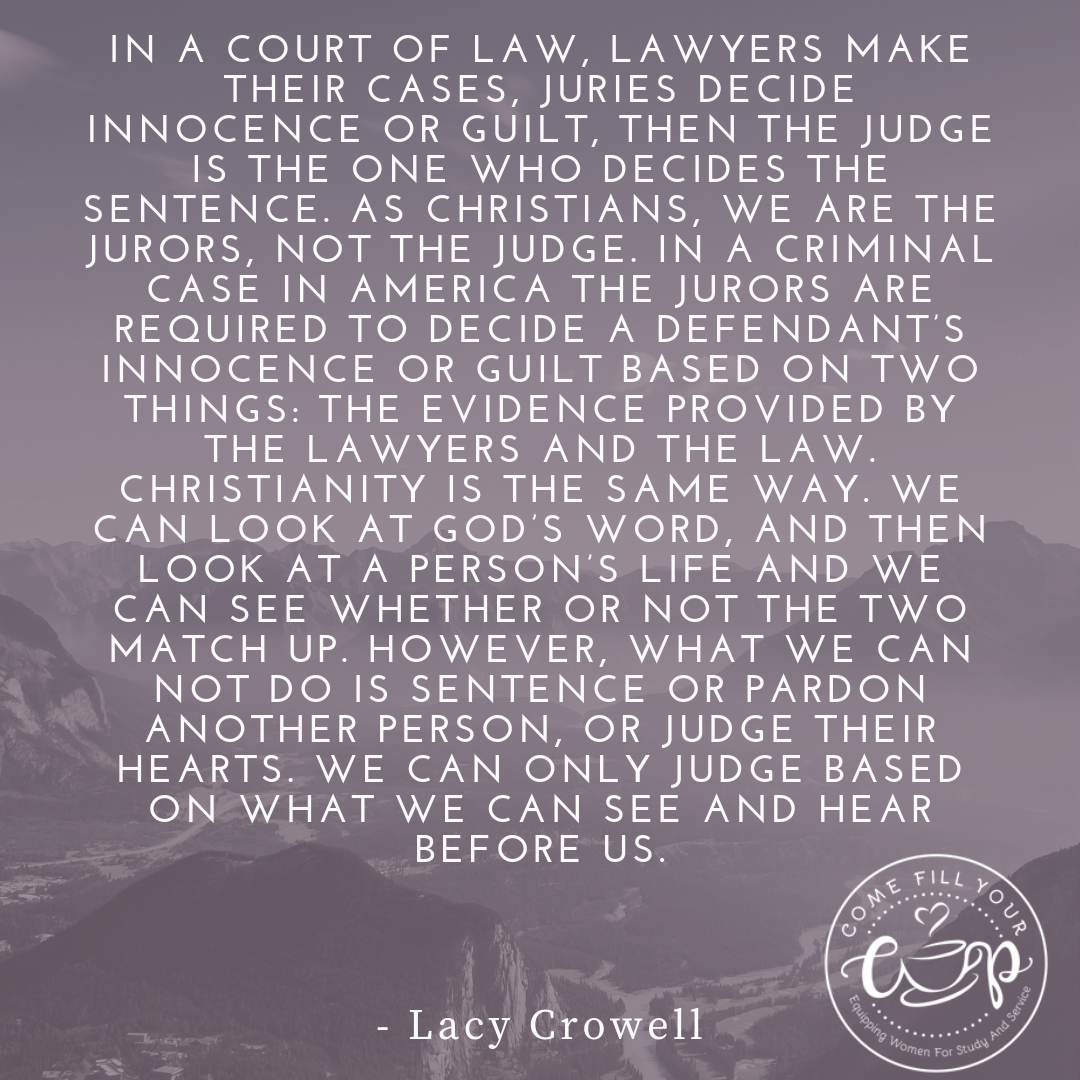I really love the beautiful ironies that can be found in Scripture. These are the Scriptures that when people just glance at them they say, “That’s a contradiction!” My favorite/least favorite ironic passage is Matthew 7:1-6. Verse 1 reads (ESV), “Judge not, that you be not judged.” Verse 6 says, “Do not give dogs what is holy, and do not throw your pearls before pigs, lest they trample them underfoot and turn to attack you.” So wait a minute, we aren’t supposed to judge, but we also aren’t to throw pearls before pigs. How can we tell who the pigs are if we don’t judge? In this article, we are going to look at this passage to see whether or not it contradicts itself, then we’ll look and see how we can best apply this in our lives.
Verse one of Matthew 7 is probably one of the most used and abused passages in Scripture. People are constantly using this verse to say that Christians have no right to say that homosexuality, abortion, or pretty much anything else is sinful. “You can’t judge them!” I suggest to you that this is not what this passage is referring to at all.
 In this verse the word, “judge” is the Greek word krino, meaning, “to assume the office of judge.” In a court of law, lawyers make their cases, juries decide innocence or guilt, then the judge is the one who decides the sentence. As Christians, we are the jurors, NOT the judge. In a criminal case in America the jurors are required to decide a defendant’s innocence or guilt based on two things: the evidence provided by the lawyers and the law. Christianity is the same way. We can look at God’s Word, and then look at a person’s life and we can see whether or not the two match up. However, what we can NOT do is sentence or pardon another person, or judge their hearts. We can only judge based on what we can see and hear before us.
In this verse the word, “judge” is the Greek word krino, meaning, “to assume the office of judge.” In a court of law, lawyers make their cases, juries decide innocence or guilt, then the judge is the one who decides the sentence. As Christians, we are the jurors, NOT the judge. In a criminal case in America the jurors are required to decide a defendant’s innocence or guilt based on two things: the evidence provided by the lawyers and the law. Christianity is the same way. We can look at God’s Word, and then look at a person’s life and we can see whether or not the two match up. However, what we can NOT do is sentence or pardon another person, or judge their hearts. We can only judge based on what we can see and hear before us.
Unfortunately, there are religions in our world today whose followers believe that their religious leaders have the authority to pardon sins or punish the guilty. In this passage Jesus clearly teaches that this is not the case. We can teach God’s Word, and we can correct (in love) those we see who are living in opposition to His Word, but only Christ can pardon sins.
Matthew 7:2-5 goes on to give us an even more in-depth picture of exactly what Christ is talking about here, and why we are not to judge each other. “For with the judgment you pronounce you will be judged, and with the measure you use it will be measured to you. Why do you see the speck that is in your brother’s eye, but do not notice the log that is in your own eye? Or how can you say to your brother, ‘Let me take the speck out of your eye,’ when there is the log in your own eye? You hypocrite, first take the log out of your own eye, and then you will see clearly to take the speck out of your brother’s eye.”
 We cannot judge each other because as humans we just don’t see things clearly. Have you ever been in the situation where you saw someone whose kid was really acting up and you were thinking, “Come on mom, do something!” Then a few days later you noticed your own child doing the same thing? It’s so easy to see what other people need to change, but it’s a lot harder to see the changes that we need to make in our own lives.
We cannot judge each other because as humans we just don’t see things clearly. Have you ever been in the situation where you saw someone whose kid was really acting up and you were thinking, “Come on mom, do something!” Then a few days later you noticed your own child doing the same thing? It’s so easy to see what other people need to change, but it’s a lot harder to see the changes that we need to make in our own lives.
A good example of this is 2 Samuel 12:1-7. David had no problem seeing the sin of the man who took the lamb, but can you imagine the look on his face when Nathan said, “YOU are the man!” I am afraid there will be many people in David’s shoes on Judgment Day: people who have had no problem seeing the sin in the lives of others, but have not evaluated their own lives as closely.
Now we come to verse 6, “Do not give dogs what is holy, and do not throw your pearls before pigs, lest they trample them underfoot and turn to attack you.” You know the battle cry of the Lord’s church, “context, context, context!” So how does this verse fit with the 5 verses before it? So often Christ commands his followers to reach out to the world with His word, and I believe that in these six verses He’s telling us how to do it as effectively as possible. First of all, we aren’t to put ourselves in the position of judge. We can’t decide pardons and punishments for other people. But at the same time, we are not to throw pearls before swine. I think proper understanding of this passage is in the specific examples that Jesus used. First we have dogs. At this point in time many of the dogs were wild and vicious (I Kings 14:11, I Kings 16:4, II Kings 9:10). The second example we have are pigs. There’s something very interesting about livestock shows. These animals are worked with for hours and hours, and are trained to be led around and positioned by halters. EXCEPT for the pigs. The pigs just won’t listen. Instead of halters, they have to be trained with sticks.
I think proper understanding of this passage is in the specific examples that Jesus used. First we have dogs. At this point in time many of the dogs were wild and vicious (I Kings 14:11, I Kings 16:4, II Kings 9:10). The second example we have are pigs. There’s something very interesting about livestock shows. These animals are worked with for hours and hours, and are trained to be led around and positioned by halters. EXCEPT for the pigs. The pigs just won’t listen. Instead of halters, they have to be trained with sticks.
I am sure we have all had experiences where we were trying to study with someone and we really just felt like going after them with a stick. Don’t do that. Unfortunately though, there are going to be people out there that just won’t listen. For one reason or another, at that point in their lives they are just not interested and they make it pretty obvious. Instead of taking a stick to them, Jesus tells us to just walk away.
God’s Word is a precious pearl in our lives, it is holy. There are so many people in this world that are starving for God’s Word; we don’t have time to try to force it on people who don’t want it. This is why I said that this is my favorite/least favorite ironic passage. I always grow from studying this passage, but the application is just SO hard.
There is a reason that Jesus tells us to walk away though, and it’s found in the last part of the verse. The end of the passage says, “lest they trample them underfoot and turn to attack you.” Lately, I have been engaged in a Bible study with a friend from high school who is now an atheist. At first we were having a friendly discussion, but as more and more of his arguments became null and void, he got angrier and angrier until he went completely on the attack.
 I plowed on with this friend for days, and finally my husband stopped me. He pointed out how much our friend’s anger and antagonism was affecting me. I was discouraged, and it had even gotten to the point where I wasn’t sleeping at night because I was so stressed and upset. I love this guy– he’s our friend– but I can’t continue to cast pearls before swine. There are other people out there who DO want to know the truth, and I can’t reach out to them if a friend who isn’t interested is getting all of my attention; but I also can’t keep on and on with someone who isn’t interested because if I do it’s going to hurt my own soul.
I plowed on with this friend for days, and finally my husband stopped me. He pointed out how much our friend’s anger and antagonism was affecting me. I was discouraged, and it had even gotten to the point where I wasn’t sleeping at night because I was so stressed and upset. I love this guy– he’s our friend– but I can’t continue to cast pearls before swine. There are other people out there who DO want to know the truth, and I can’t reach out to them if a friend who isn’t interested is getting all of my attention; but I also can’t keep on and on with someone who isn’t interested because if I do it’s going to hurt my own soul.
As hard as this is to do with friends, I know it’s even worse when the person who just won’t listen is your family. But sisters, Jesus cares for our family even more than we do, and He also cares for us. I am not saying that we should ever write off someone and say that there is no hope for them, but there is a difference in planting a seed and then walking away, praying for that person when they aren’t interested and continuing to actively study with that person. We won’t do any good for anyone if we hurt our own soul with discouragement.
We all know that there are no contradictions in Scripture and this passage is no exception. I believe these verses can have a tremendous impact on our personal evangelism, and even our relationships with our brethren if we really take them to heart. Let us do our best to not put ourselves in the position of a judge over others, and as difficult as it may be, let’s really try to make sure we are using our pearls for those who will make them into the beauty of repentance.
- Upside Down - August 15, 2024
- Generations: What’s the Worst that Could Happen? - December 21, 2022
- Generations: Where Did the Time Go? - November 16, 2022
 Welcome! We are so glad you stopped by. Come Fill Your Cup is a group of Christian ladies dedicated to equipping women for study and service. We know you are busy and that life’s hectic pace pulls you in so many directions, but you can’t truly be the woman God desires unless you take time to fill your own cup…not with spa days (though we love a good spa!) or the latest novel…but with God’s Holy Word. We want to help you with that! Our goal is to reach you in the midst of your busy day and give you encouragement, education, and fellowship as you strive to live the life God has laid before you. Our prayer is that we can help fill your cup so that you, in turn, can overflow to all those around you. So, as we like to say…come fill your cup, and let it overflow!
Welcome! We are so glad you stopped by. Come Fill Your Cup is a group of Christian ladies dedicated to equipping women for study and service. We know you are busy and that life’s hectic pace pulls you in so many directions, but you can’t truly be the woman God desires unless you take time to fill your own cup…not with spa days (though we love a good spa!) or the latest novel…but with God’s Holy Word. We want to help you with that! Our goal is to reach you in the midst of your busy day and give you encouragement, education, and fellowship as you strive to live the life God has laid before you. Our prayer is that we can help fill your cup so that you, in turn, can overflow to all those around you. So, as we like to say…come fill your cup, and let it overflow!
Wonderful article, chock full of wisdom Lacy, thank you!
Lacy, I really needed to read this today. Thank you so much for your wise words.
Wow! Thank you for sharing your insight with us!
Great article, Lacy. One of the best I’ve read on those Scriptures. The trouble with some is they don’t recognize them as swine until after they’ve thrown their pearls.